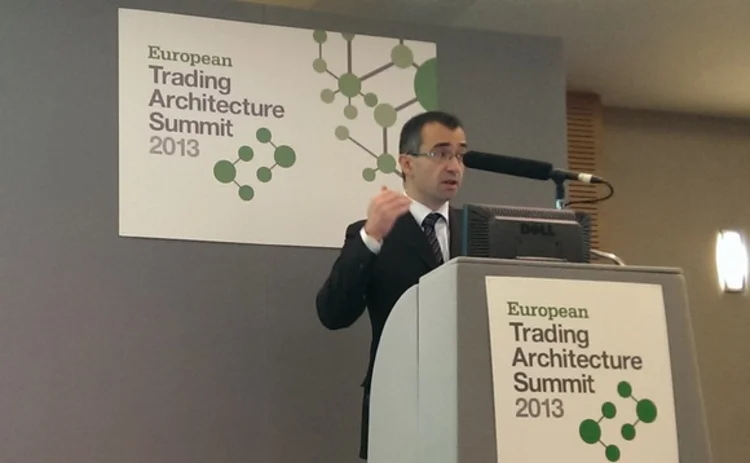ETAS 2013: To Meet Challenges, IT Needs "Commando" Units

Speaking to a crowded room at the Canary Wharf Hilton, London, on November 19, Dulon highlighted that the combined pressures of cost reduction, while still maintaining quality of service, are forcing IT departments to reconsider their roles within banks.
"IT expense has to decrease, sharply," he explained. "It can't be immune to a decrease in general expenses, and we have to make do with less money. Secondly, it's clear that you can't arbitrate the quality of service. All CIBs are taking less market risk, because we can't afford to do so. But we have to deal with higher volumes, and the service has to be at a high level. You have to do more 24/7 service, and you have to adapt to the new market conditions. You can't lower your IT investment, either, because business requirements are so high─just look at the electronic trading sphere, where you need to invest in algorithms, in market access, and in new markets. You need to commit money just to be in the market."
Business Lines
In short, Dulon argued, this means that IT can no longer see itself as a pure support function, instead moving towards the model of becoming a "company within the company".
While the change may seem superficial when illustrated in brief terms, and in line with other ideas that service provision from IT is no longer isolated from the wider environment, Dulon took the notion further. An inherent aspect of this transformation, he said, is re-assessing the way in which the various aspects of an IT estate are developed and maintained.
Tackling the psychological and traditional aspects of this, though, is where wholesale change will be required. A thorough assessment, he believes, will generate three distinct strata of IT requirements─those that add value through original development, those that are crucial to a bank's operation but do not necessarily benefit from being differentiated, and those that need developmental alacrity to perform as needed.
I think we have to put in place "commando" organizations, very close to the end users and internal customers, which are really developing appropriate technologies. We used to do this for pure front-office activities like pricing or spreadsheets, but the idea can be rolled out to other areas.
For this last category, Dulon advocated a form of guerilla development, with roaming teams that have the flexibility to adapt to quick requirements across the organization.
"You'll probably end up with three distinct areas. The first is that you want something quick, in order to try out an idea or a model, and what you want isn't something reliable or costly, you want it rapidly," he explained. "That's the value you deliver. But to do that, I think we have to put in place "commando" organizations, very close to the end users and internal customers, which are really developing appropriate technologies. We used to do this for pure front-office activities like pricing or spreadsheets, but the idea can be rolled out to other areas. This is predicated on the idea of delivering things at speed."
Mutual Benefit
Outside of these commando teams, the other two areas also demanded reform according to the new doctrine. A smaller part of the IT estate will be the one that contains a bank's developmental IP, he explained, but this often has a high degree of outsourcing or offshoring. To protect a bank's competitive edge, investment is needed to bring this back into the fold.
"For this kind of application, we have to make sure that we control, from A to Z, the entire development process," he said. "If you look at what we've been doing for years, because we've been considering IT as a single process, we've been trying to optimize the cost of delivery. As a result, you'll probably find a lot of outsourced business here, a lot of offshoring and contractors. So we have to accept more IT expense, and have something like 90 percent of the staff being internal."
Where cost reduction can be achieved, he said, is in the third segment, which is the common systems that are vital to operations, but not necessarily individualized. Here, there can be benefits realized from mutualization, either between banks or outside firms such as vendors, or from outsourcing and offshoring.
"This idea of segregating your IT systems into these three categories, and adapting your process to them, is one way to end up with a much more effective economy for your systems, and being able to re-allocate investment to the key points," he argued. "It's very difficult to achieve, and it's a huge transformation in the way that people act today."
The Bottom Line
- IT departments are faced with the need to reduce their cost base, while delivering the same level of service quality. A further complication comes from the fact that heavy investment is always needed, just to be competitive.
- Taking this in mind, a psychological and organizational shift is needed, where bank IT departments becomes business lines in their own right, as opposed to pure support functions.
- The stratification of IT services into three components, with various levels of flexibility and industrialization as appropriate, is one way of meeting the critical challenges that IT is now faced with.
Only users who have a paid subscription or are part of a corporate subscription are able to print or copy content.
To access these options, along with all other subscription benefits, please contact info@waterstechnology.com or view our subscription options here: http://subscriptions.waterstechnology.com/subscribe
You are currently unable to print this content. Please contact info@waterstechnology.com to find out more.
You are currently unable to copy this content. Please contact info@waterstechnology.com to find out more.
Copyright Infopro Digital Limited. All rights reserved.
You may share this content using our article tools. Printing this content is for the sole use of the Authorised User (named subscriber), as outlined in our terms and conditions - https://www.infopro-insight.com/terms-conditions/insight-subscriptions/
If you would like to purchase additional rights please email info@waterstechnology.com
Copyright Infopro Digital Limited. All rights reserved.
You may share this content using our article tools. Copying this content is for the sole use of the Authorised User (named subscriber), as outlined in our terms and conditions - https://www.infopro-insight.com/terms-conditions/insight-subscriptions/
If you would like to purchase additional rights please email info@waterstechnology.com
More on Trading Tech
Chris Edmonds takes the reins at ICE Fixed Income and Data Services
Edmonds is now leading ICE’s fixed income and data business as the rush to provide better data and analytics in fixed income builds.
Systematic tools gain favor in fixed income
Automation is enabling systematic strategies in fixed income that were previously reserved for equities trading. The tech gap between the two may be closing, but differences remain.
Waters Wrap: Examining the changing EMS landscape
After LSEG’s decision to sunset Redi, Anthony examines what might lie ahead for the EMS space.
This Week: Clear Street, AXA/AWS, TD Bank/Google Cloud and more
A summary of the latest financial technology news.
LSEG to sunset Redi EMS in favor of Tora
Sources say competitors will look to seize on the decision to win over Redi’s sizeable US client base.
WatersTechnology latest edition
Check out our latest edition, plus more than 10 years of our best content.
Getting aggressive: Overbond uses AI to assess dealer axes
The fixed-income analytics specialist has developed a new tool to help buy-side firms decide if they’re getting a good price from their dealers.
Most read
- Deutsche Börse democratizes data with Marketplace offering
- Chris Edmonds takes the reins at ICE Fixed Income and Data Services
- Sell-Side Technology Awards 2024: All the winners








